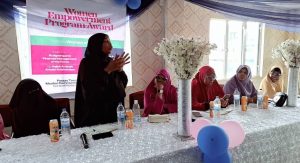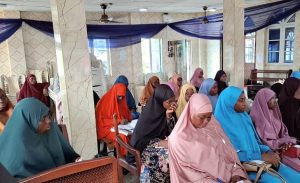…honours three Nigerians with ‘women of substance’ awards
• We want to encourage enterprise, good saving culture among women: organisers
The professional wing of Al-Mu’minaat (the believing women) organisation, Amuwo Odofin Local Government area of Lagos chapter, on Saturday, held an empowerment seminar for its members, with facilitators harping on prioritising expenses and integrity as fundamental qualities they need to imbibe in their daily affairs.
The seminar, with the theme: ‘Women of Substance’ was held at Festac Town Muslim Community Central Mosque to celebrate Muslim women for their outstanding achievements and dedication to serving the community and ummah in general.
While welcoming guests to the event, the Branch Amirah (President), Hajiah Sekinah Adeboye, said the seminar came in handy to educate Muslim women on cutting costs as inflation affecting household items is on the increase.
She said the organisation seeks to encourage a good saving culture among women in the society.
Speaking on the theme, Hajiah Adeboye said, “Among us, we have some women of substance. They are well-equipped intellectually and financially. They are hardworking and even thrive in male-dominated fields. They should not relent and to other women, they should find something to do, either online or offline. In this era, we don’t want to hear ‘I am a full housewife without doing anything’. A woman can be at home and still find something to do by taking advantage of modern technology,” the Amirah said.
One of the guest lecturers at the event, Hajiah Aminah Ariyibi-Adekomaya, said women can survive amid the rising inflation by prioritising their expenses.
Speaking on the sub-theme: ‘Budgeting and financial management of the home,’ Hajiah Ariyibi-Adekomaya added that by prioritising expenditure women will spend less.
“It’s no longer news that there’s inflation and the cost of living has increased across all expenditure lines. Household expenses are divided into expenditures on rent, food, education, clothing, healthcare, and some other things. We can survive inflation by prioritizing our expenses. We can achieve this if we identify all the things we spend money on a monthly or yearly basis.

“We prioritize the very important ones. The regular ones are expenditures on utilities, transportation, food or groceries and other important ones. The irregular expenditures are healthcare, car repairs and household maintenance. While there are one-off expenditures like rent, and delivery charges.
“If we’re able to identify the prioritise expenditure, we’d try our best to spend less than what we earn. Also, we try not to load our expenditures. We have a general view of what we spend in a month. And there’s an impending expenditure that we apply the rule of ease off/add-on. We try to let go or discharge a certain expense to the barest minimum before we add on another type of expenditure. If we try this, we’d find it more healthy to live and to be able to have a stress-free solution to our problem,” she said.
For her part, the second guest lecturer, Managing Director at Hafbamproperties, Hajiah Hafsah Balogun-Omotoso, spoke on ‘Building a career in real estate, pros and cons for Muslim women.’
Hajia Balogun-Omotoso, a certified member of one of the top brokerage firms in Africa (BRG) said real estate is a very rewarding enterprise, encouraging Muslim women to tap into the opportunities presented by it.
“You’ll be helping people and not just making money but living a peaceful and successful life. You’ll be helping them to solve a problem and achieve one of the necessities of life and shelter.
“The three necessities are food, clothing, and shelter. So, you’d be helping them to achieve at least one of them. You’ll also be rewarding yourself because when you’re an investor, you’ll reward yourself. Real estate is rewarding and you’ll show evidence for all the years of hard work.”
Hajia Balogun-Omotoso, however, charged Muslim women to put the fear of Allah and integrity into consideration in their dealings.
“Some people get to tell lies because they want to make more money. They tend to give a location that’s not right. For example by telling people that it’s a five-minute drive from law school or from somewhere else.
“We should be aware that we’re Muslims first before becoming real estate agents or consultants and we should have the fear of Allah in everything we do. Integrity should come first. Even though we miss the money at that time, we know that we have gotten Allah’s pleasure by speaking the truth,” she said.

She tasked genuine real estate practitioners to register to prevent the public from fraudsters.
“Like I said, real estate consultants should be registered and licensed. Many people just go into it to make money, but if we do it because we want to help people, we have to do the right thing. To identify them, ask for their license number and certification or anything to show that they’re legit in practice. For instance, if you want to practice law, you should have something to show for it. It’s the same thing as a real estate consultant. Once that is sorted, every other thing follows,” she noted.
Hajiah Balogun-Omotoso, a graduate of the Metropolitan School of Business and Management in the UK; and the duo of Hajiah Bankole Bolanle Ganiyat and Hajiah Mutiat Orolu-Balogun were honoured with the ‘Women of Substance’ awards by the professional wing of the organisation.
Hajiah Bankole is a distinguished Muslim woman with a long history of excellence in the field of revenue collection.
A graduate of Geography and Planning from the University of Jos, she worked at Duala International Limited in Jos and then Megalek Nigeria Limited before she moved to Amuwo Odofin’s Mother and Child Center.
The last awardee, Hajiah Orolu-Balogun, a Law graduate from Lagos State University, LASU, is the Executive Director of Hijab Rights Advocacy Initiative, an NGO catering to the rights of Muslim women.
She was among the counsel who worked on the popular Asiyat Abdulkareem vs. Lagos State case (the hijab case) until the Supreme Court, where the apex court upheld the rights of Muslim girls to wear the hijab in all public institutions.
Hajiah Orolu-Balogun every year leads a coalition of about 20 Islamic organisations to plan World Hijab Day, a day dedicated to bringing awareness to the plight of Muslim women in hijab globally.



